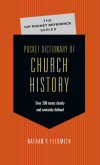IVP Academic Library Expansion Bundle (40 vols.)
Digital Logos Edition
Overview
With the IVP Library Expansion Bundle, you have everything you need for serious Bible study right at your fingertips. This bundle includes volumes from the Essentials Series, a collection of in-depth workbooks that brings the essentials of Christian ministry into contact with the real life of the congregation; the Spectrum Series, which offers a range of viewpoints on academic topics about which Christians clearly disagree; the Pocket Reference Series, designed for students, pastors, and other busy people who want an aid to tackle the study of biblical languages, church history, apologetics, contemporary religions, ethics, theology, and more; and the Reformation Commentary on Scripture, which introduces believers to the great diversity that constituted the Reformation, providing a reliable guide to the history of the period.
Informative, clear, and easy to read, the books included in this series will become your constant companion as you delve into the riches of theology and doctrine that tackle many of the topics of the day, shedding new light on beliefs often taken for granted. There’s something for everyone here, from preachers and ministry leaders to mature and new believers. Expand your library today!
In the Logos editions, these volumes are enhanced by amazing functionality. Important terms link to dictionaries, encyclopedias, and a wealth of other resources in your digital library. Perform powerful searches to find exactly what you’re looking for. Take the discussion with you using tablet and mobile apps. With Logos Bible Software, the most efficient and comprehensive research tools are in one place, so you get the most out of your study.
Get the latest in cutting-edge New Testament research with Library of New Testament Studies: 2015 (35 vols.).

Key Features
- Provides workbooks that bring the essentials of Christian ministry into contact with the real life of the congregation
- Offers a range of viewpoints on academic topics about which Christians clearly disagree
- Introduces believers to the great diversity that constituted the Reformation
Product Details
- Title: IVP Library Expansion Bundle (40 vols.)
- Publisher: IVP
- Volumes: 40
- Pages: 8,251
Individual Titles
- Baptism: Three Views edited by David F. Wright
- Biblical Hermeneutics: Five Views edited by Stanley E. Porter and Beth M. Stovell
- Christian Spirituality: Five Views of Sanctification edited by Donald Alexander
- Church, State and Public Justice: Five Views edited by P.C. Kemeny
- Divine Foreknowledge: Four Views edited by James K. Beilby and Paul R. Eddy
- Science and Christianity: Four Views edited by Richard F. Carlson
- Faith and Reason: Three Views edited by Steve Wilkens
- God & Morality: Four Views edited by R. Keith Loftin
- God & Time: Four Views edited by Gregory E. Ganssle
- The Historical Jesus: Five Views edited by James K. Beilby and Paul R. Eddy
- Justification: Five Views edited by James K. Beilby and Paul Rhodes Eddy
- The Lord's Supper: Five Views edited by Gordon T. Smith
- The Meaning of the Millennium: Four Views edited by Robert G. Clouse
- The Nature of the Atonement: Four Views edited by James K. Beilby and Paul R. Eddy
- Predestination & Free Will: Four Views of Divine Sovereignty and Human Freedom edited by David Basinger and Randall Basinger
- Psychology & Christianity: Five Views (2nd Edition) edited by Eric L. Johnson
- Two Views of Hell: A Biblical & Theological Dialogue by Edward William Fudge and Robert A. Peterson
- What About Those Who Have Never Heard? Three Views on the Destiny of the Unevangelized edited by Gabriel Fackre, Ronald H. Nash, and John Sanders
- Women in Ministry: Four Views edited by Bonnidell Clouse and Robert G. Clouse
- Leadership Essentials: Shaping Vision, Multiplying Influence, Defining Character by Greg Ogden and Daniel Meyer
- The Essential Commandment: A Disciple's Guide to Loving God and Others by Greg Ogden
- Witness Essentials: Evangelism that Makes Disciples by Daniel Meyer
- New Testament Essentials: Father, Son, Spirit and Kingdom by Robbie Fox Castleman
- Old Testament Essentials: Creation, Conquest, Exile and Return by Tremper Longman III
- Reformation Commentary on Scripture: New Testament, Volume III, Luke edited by Beth Kreitzer
- Reformation Commentary on Scripture: New Testament, Volume IV, John 1-12 edited by Craig S. Farmer
- Reformation Commentary on Scripture: New Testament, Volume VI, Acts edited by Esther Chung-Kim and Todd R. Hains
- Reformation Commentary on Scripture: New Testament, XI, Philippians, Colossians edited by Graham Tomlin
- Pocket Dictionary for the Study of Biblical Hebrew by Todd J. Murphy
- Pocket Dictionary of Church History by Nathan P. Feldmeth
- Pocket Dictionary of Ethics by Stanley J. Grenz and Jay T. Smith
- Pocket Dictionary of the Reformed Tradition by Kelly M. Kapic and Wesley Vander Lugt
- Pocket Guide to World Religions by Winfried Corduan
- Pocket Handbook of Christian Apologetics by Peter Kreeft and Ronald K. Tacelli
- Pocket History of the Church by D. Jeffrey Bingham
- Pocket History of Theology by Roger E. Olson and Adam C. English
- Pocket Dictionary for the Study of New Testament Greek by Matthew S. DeMoss
- Pocket Dictionary of Apologetics and Philosophy of Religion by C. Stephen Evans
- Pocket Dictionary of Biblical Studies by Arthur G. Patzia and Anthony J. Petrotta
- Pocket Dictionary of Theological Terms by Stanley J. Grenz, David Guretzki, and Cherith Fee Nordling
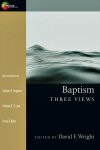
The Christian church confesses "one baptism." But the church's answers to how, whom, and when to baptize, and even what it means or does, are famously varied. This book provides a forum for thoughtful proponents of three principal evangelical views to state their case, respond to the others, and then provide a summary response and statement. Sinclair Ferguson sets out the case for infant baptism, Bruce Ware presents the case for believers' baptism, and Anthony Lane argues for a mixed practice.
As with any good conversation on a controversial topic, this book raises critical issues, challenges preconceptions, and discloses the soft points in each view. Evangelicals who wish to understand better their own church's practice or that of their neighbor, or who perhaps are uncertain of their own views, will value this incisive book.
If you're undecided on when baptism is proper, or if your mind is made up but you want to understand why equally faithful Christians have an opposite position to yours, read Baptism: Three Views.
—Marvin Olasky, WORLD, August 15, 2009
Regardless of one's theological stance on baptism, the essays in this volume will serve to sharpen and challenge. . . This volume can be very helpful in a variety of venues and climates if people are willing to engage the issue openly and to give an honest hearing of divergent opinions.
—Brian Allred, Mid-America Journal of Theology, October 2010
If one is looking for a good read on the issues surrounding believer's baptism versus infant baptism, with a hybrid third option thrown in for good measure, then Baptism: Three Views is a recommended place to start.
—Rustin Umstattd, Midwestern Journal of Theology, 2009
David F. Wright (1937-2008) was professor of patristic and Reformation Christianity at New College, University of Edinburgh. He wrote a number of books on both historical and theological topics.
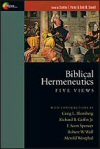
Five experts in biblical hermeneutics gather here to state and defend their approach to the discipline. Contributors include: Craig Blomberg with the historical-critical/grammatical approach, Richard Gaffin with the redemptive-historical approach, Scott Spencer with the literary/postmodern approach, Robert Wall with the canonical approach, and Merold Westphal with the philosophical/theological approach.
This is an undoubtedly interesting volume. The contributors describe their methodologies clearly and largely succeed in making the abstract and theoretical nature of the subject matter accessible.
—Jonathan Kearney, Journal for the Study of the New Testament, 35(5)
Biblical Hermeneutics is a welcome addition to the often labyrinthine discussion of biblical interpretation. Each essay is clearly and astutely written, and the congenial tone of the contributors is refreshing.
—Andrea L. Robinson, Journal for Baptist Theology and Ministry, Fall 2013
The dialogue between these five views presents a basic hermeneutical conversation in a very accessible way. . . . Academics, students of biblical studies, and pastors will find this a helpful addition to their libraries.
—Matthew James Hamilton, Bible Study Magazine, September/October 2012
Stanley E. Porter (PhD, University of Sheffield) is president, dean, and professor of New Testament at McMaster Divinity College in Hamilton, Ontario. At McMaster, he also holds the Roy A. Hope Chair in Christian Worldview. He is the author of numerous studies in the New Testament and Greek language, including The Paul of Acts: Essays in Literary Criticism, Rhetoric, and Theology; Idioms of the Greek New Testament and Verbal Aspect in the Greek of the New Testament, with Reference to Tense and Mood. He has also edited volumes such as History of Classical Rhetoric in the Hellenistic Period, 330 B.C.-A.D. 400 and Handbook to Exegesis of the New Testament.
Beth M. Stovell (PhD, McMaster Divinity College) is assistant professor of Old Testament at Ambrose Seminary of Ambrose University, Calgary, Alberta, Canada. She has authored Mapping Metaphorical Discourse in the Fourth Gospel: John's Eternal King and co-edited Biblical Hermeneutics: Five Views with Dr. Stanley E. Porter. Beth has also contributed chapters in edited volumes such as Holy Spirit: Unfinished Agenda, Devotions on the Hebrew Bible and Global Perspectives on the Bible.
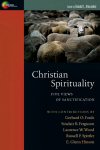
How can we grow closer to God? Is there a secret to spiritual life? Do we need a second blessing? Is sanctification God's work or ours? Is it instantaneous or is it a process?
The nature of Christian spirituality has been widely debated throughout the history of the church. The doctrine of sanctification was one of the main fissures separating Luther from the Catholic Church. Even today, different groups of Protestants disagree on how we draw closer to God. What distinguishes the different positions and what exactly is at stake in these recurring debates?
To answer these questions, Donald L. Alexander, professor of biblical theology at Bethel College, has brought together five scholars that represent each of the main historical Protestant traditions. With an introduction by Alexander and responses to each of the main essays by the other contributors, this book provides a helpful and stimulating introduction to an important doctrine of the church.
Donald Alexander (PhD, University of California, Santa Barbara) is emeritus professor of Biblical Studies at Bethel University, St. Paul, MN. He served for ten years as a missionary at the Alliance Bible Seminary, Hong Kong, China. He is the author of The Pursuit of Godliness: Sanctification in Christological Perspective.
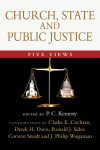
Abortion. Physician-assisted suicide. Same-sex marriages. Embryonic stem-cell research. Poverty. Crime. What is a faithful Christian response?
The God of the Bible is unquestionably a God of justice. Yet Christians have had their differences as to how human government and the church should bring about a just social order. Although Christians share many deep and significant theological convictions, differences that threaten to divide them have often surrounded the matter of how the church collectively and Christians individually ought to engage the public square.
What is the mission of the church? What is the purpose of human government? How ought they to be related to each other? How should social injustice be redressed? The five noted contributors to this volume answer these questions from within their distinctive Christian theological traditions, as well as responding to the other four positions. Through the presentations and ensuing dialogue, we come to see more clearly what the differences are, where their positions overlap, and why they diverge.
Each contributor is well chosen and provides a concise and readable presentation, making the book an excellent introduction to the issues of church and state.
—Darrell Cole, Journal of Church and State, Autumn 2007
P.C. Kemeny (PhD, Princeton Theological Seminary; ThM, Duke University; MDiv, Westminster Seminary) is professor of religion and humanities at Grove City College in Grove City, Pennsylvania.
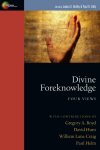
The question of the nature of God's foreknowledge and how that relates to human freedom has been pondered and debated by Christian theologians at least since the time of Augustine. And the issue will not go away.More recently, the terms of the debate have shifted, and the issue has taken on new urgency with the theological proposal known as the openness of God. This view maintains that God's knowledge, while perfect, is limited regarding the future, inasmuch as the future is "open" and not settled.
Divine Foreknowledge: Four Views provides a venue for well-known proponents of four distinct views of divine foreknowledge to present their cases:Gregory A. Boyd of Bethel College presents the open-theism view, David Hunt of Whittier College weighs in on the simple-foreknowledge view, William Lane Craig of Talbot School of Theology takes the middle-knowledge view, and Paul Helm of Regent College, Vancouver, presents the Augustinian-Calvinist view.
All four respond to each of the other essayists, noting points of agreement and disagreement. Editors James K. Beilby and Paul R. Eddy introduce the contemporary debate and also offer a conclusion that helps you evaluate the relative strengths and weaknesses of each view. The result is a unique opportunity to grapple with the issues and arguments and frame your own understanding of this important debate.
James K. Beilby is professor of systematic and philosophical theology at Bethel University in St. Paul, Minnesota. His books include Why Bother With Truth?, The Meaning of the Atonement: Four Views, Naturalism Defeated?, and For Faith and Clarity. His articles and essays have appeared in such publications as Faith and Philosophy, Philosophia Christi, Religious Studies, International Journal for Philosophy of Religion, and Journal of the Evangelical Theological Society.
Paul R. Eddy is professor of theology at Bethel University in St. Paul, Minnesota. His books include John Hick's Pluralist Philosophy of World Religions, Across the Spectrum: Understanding Issues in Evangelical Theology, and Divine Foreknowledge: Four Views.
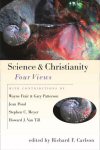
Science and Christianity. Are they partners or opponents?
Christians have long debated the relationship of science to faith. With the rise of Darwinism, however, the issue took on new significance. Darwinism appeared to undermine the authority of the Bible and the credibility of Christianity by freeing science of the need for a Creator. Rethinking the relationship between science and Christianity quickly became a priority.
- How does a faithful Christian respond to the pronouncements of contemporary science?
- Is science a help or a hindrance to belief?
- Are science and the Bible in conflict?
At the beginning of the twenty-first century, Christians continue to wonder whether faith and science are partners or opponents. In this book six Christian scholars sort through the issues as they present four different views on the relationship of science and Christianity. These include Wayne Frair and Gary D. Patterson for “creationism,” Jean Pond for “independence,” Stephen C. Meyer for “qualified agreement” and Howard J. Van Till for “partnership.” Each contributor responds to the other scholars, noting points of agreement and disagreement. Editor Richard F. Carlson offers an introduction to this contemporary debate as well as a postscript to help us evaluate the strengths and weaknesses of each view.
Richard F. Carlson is research professor of physics at the University of Redlands in Redlands, California and formerly a visiting scientist in the department of radiation sciences at Uppsala University, Sweden. He received a BS (University of Redlands), MS and PhD (University of Minnesota) in physics, and an MA (Fuller Theological Seminary) in biblical studies and theology.
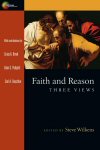
Life confronts us with an endless stream of questions. Some are trivial. But some draw us into the deepest dimensions of human inquiry, a place where our decisions have profound implications for life and faith. Is there a God, and if so, how can I know anything about who or what God is? Is the quest for truth an elusive dream? How should I live and what should I value? What happens at the end of my biological existence?
These questions lead people of every creed and belief to consider important existential concepts. But many people wrestle with the relationship between faith and reason as they dig into the roots of this theological and philosophical pursuit. Does a shared interest in a common set of questions indicate that philosophy and theology are close kin and allies, or are they competitors vying for our souls, each requiring a loyalty that excludes the other?
In Faith and Reason, Steve Wilkens edits a debate between three different understandings of the relationship between faith and reason, between theology and philosophy. The first viewpoint, Faith and Philosophy in Tension, proposes faith and reason as hostile, exclusive opposites, each dangerous to the integrity of the other. The second, Faith Seeking Understanding, suggests that faithful Christians are called to make full use of their rational faculties to aid in the understanding and interpretation of what they believe by faith. In the third stance, Thomistic Synthesis, natural reason acts as a handmaiden to theology by actively pointing people toward salvation and deeper knowledge of spiritual truths.
Bringing together multiple views on the relationship between faith, philosophy, and reason, this introduction to a timeless quandary will help you navigate, with rigor and joy, one of the most significant discussions of the Christian community.
The relationship between faith and reason, or between our philosophical assumptions and our theological ones, is a matter of fundamental importance. In this volume, three views on this topic are brought into dialogue with one another, giving readers an immediate sense of some of the key issues and objections that pertain to this perennial debate. It is a helpful resource and a useful way into questions of method in theology from which students are sure to benefit.
—Oliver D. Crisp, professor of systematic theology, Fuller Theological Seminary
Both the richness and the complexity of the faith/reason problem is on full display in these essays—and in the responses. . . . The strengths of the individual essays and the conversational style will open up pathways of fresh insight, deepened understanding, and will stimulate continued dialogue on this important topic in classroom settings.
—Kyle A. Roberts, Word & World, Fall 2015
Steve Wilkens (PhD, Fuller Theological Seminary) is professor of philosophy and ethics at Azusa Pacific University. His books include Hidden Worldviews, Faith and Reason: Three Views, Christianity & Western Thought (volumes 2 and 3), and Beyond Bumper Sticker Ethics. He has also taught as an adjunct faculty member at Mount San Antonio College, Glendale Community College, Fuller Theological Seminary, and Azusa Pacific University's C.P. Haggard Graduate School of Theology.
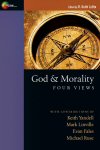
Is morality dependent upon belief in God? Is there more than one way for Christians to understand the nature of morality? Is there any agreement between Christians and atheists or agnostics on this heated issue?
In God and Morality: Four Views, four distinguished voices in moral philosophy ariticulate and defend their place in the current debate between naturalism and theism. Christian philosophers Keith Yandell and Mark Linville and two self-identified atheist/agnostics, Evan Fales and Michael Ruse, clearly and honestly represent their differing views on the nature of morality.
Important differences as well as areas of overlap emerge as each contributor states their case, receives criticism from the others, and responds. Of particular value for use as an academic text, these four essays and responses, covering the naturalist moral non-realist, naturalist moral realist, moral essentialist, and moral particularist views, will foster critical thinking and contribute to the development of a well-informed position on this very important issue.
This is an intellectually stimulating book and a good overview of natural and supernatural theories of morality. . . . If one is desirous to become better acquainted with contemporary views, Christian or not, this is a good start.
—J. Brian Huffling, Christian Apologetics Journal, Spring 2014
R. Keith Loftin (PhD, University of Aberdeen) is assistant professor of humanities at The College at Southwestern in Fort Worth, Texas.
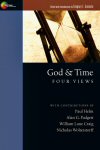
The eternal God has created the universe. And that universe is time-bound. How can we best understand God's relationship with our time-bound universe? For example, does God experience each moment of time in succession or are all times present to God? How we think of God and time has implications for our understanding of the nature of time, the creation of the universe, God's knowledge of the future, God's interaction with his creation, and the fullness of God's life.
In this book, four notable philosophers skillfully take on this difficult topic—all writing from within a Christian framework yet contending for different views. Paul Helm argues that divine eternity should be construed as a state of absolute timelessness. Alan G. Padgett maintains that God's eternity is more plausibly to be understood as relative timelessness. William Lane Craig presents a hybrid view that combines timelessness with omnitemporality. And Nicholas Wolterstorff advocates a doctrine of unqualified divine temporality.
Each essay is followed by responses from the other three contributors and a final counter-response from the original essayist, making for a lively exchange of ideas. Editor Gregory E. Ganssle provides a helpful introduction to the debate and its significance. Together, these five scholars conduct readers on a stimulating and mind-stretching journey into one of the most controversial and challenging areas of theology today.
Ganssle has collected contributions from four leading scholars on the topic of God's relationship to time. This collection is a much needed and well-executed project that will give substance to a variety of contemporary theological and philosophical discussions, including the debate about openness theology. Each of the views has been thoughtfully written, then critiqued by the other three contributors to give a balanced perspective to the reader. The authors have been careful in their handling of technical material so as not to overburden the novice without giving up on important issues that are under examination in the fields of philosophy and theology. Thus the book provides accessible discussions of options with a thorough enough coverage for a broad understanding of the topic. I highly recommend this text for anyone interested in God and time and, as the authors show, this pivotal issue must be addressed by anyone thinking seriously about the nature of God.
—David M. Woodruff, department of philosophy, Huntington College
God and Time: Four Views is an excellent introduction to the contemporary discussion of God's relation to time—a discussion with significant implications for a number of important theological issues (the nature of divine providence, the Incarnation, God's knowledge of the future, and so on). In its pages, four key participants in that discussion put their own views on the table in dialogue with one another. The result is a sophisticated but accessible primer on God and time.
—Douglas Blount, associate professor of philosophy, Southwestern Baptist Theological Seminary
This book brings together four outstanding philosophers who speak to the issue of God's relationship to time in a way that is both lucid and widely accessible. It compares the traditional view of God as timeless with three subtly different versions of the view that God lives and interacts with us in time. It is to be hoped that Ganssle's book will help to bring some clarity into the often confused discussions of this topic.
—William Hasker, professor emeritus of philosophy at Huntington College and editor, Faith and Philosophy
Gregory E. Ganssle serves with the Rivendell Institute for Christian Thought and Learning, a special project of the Campus Crusade for Christ student ministry at Yale University. He has taught philosophy at Syracuse University and has worked as a teaching fellow and part-time lecturer in the philosophy department at Yale University.
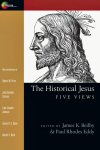
Toward the end of the Enlightenment, a fascination with providing a historical account of the life of Jesus arose among academics. This fascination remains alive and well today. Scholars have identified three separate “quests” for the historical Jesus, with the third beginning in the 1990s and continuing today. Adding to this academic effort now comes The Historical Jesus: Five Views, from some of the most prominent Jesus scholars of our day. After a scene-setting introduction by the editors that establishes a helpful context for the arguments to come, prominent figures in the Jesus quest set forth their positions and respond to their fellow scholars.
A healthy range of views are presented throughout the book, giving readers a comprehensive taste of this long-standing debate, situated within its proper context. On one end Robert M. Price lucidly maintains that the probability of Jesus' existence has reached the “vanishing point,” while on the other, Darrell Bock ably argues that while critical method yields only a “gist” of Jesus, it does in fact take us in the direction of the Gospel portraits. And between these two extremes are numerous avenues to explore, questions to ask, and “assured results” to weigh. Scholars John Dominic Crossan, Luke Timothy Johnson, and James D.G. Dunn probe these issues with formidable knowledge and insight, filling out a further range of options.
The Historical Jesus is a worthwhile addition to your library if you are a scholar, pastor, or layperson with particular interest in the intersection of the Jesus of history with the Christ of Christian faith.
—Tawa J. Anderson, Calvin Theological Journal, November 2011
James K. Beilby and Paul Rhodes Eddy succeed not only in identifying the major trends but also in bringing to the surface some of the assumptions in current historical Jesus research. They offer a sympathetic review of some of the major exponents of Jesus research from Reimarus up to the present day.
—Pieter F. Craffert, Review of Biblical Literature, May 2011
The quest to construct a historically credible presentation of Jesus is now in its third iteration, and herein five top-ranked scholars set forth their cases and critique one another, resulting in a lively give-and-take. The resultant debate is evenhanded and illuminating, setting clear, stark alternatives before the reader. Highly recommended.
—S. Young, Choice, May 2010
James K. Beilby is professor of systematic and philosophical theology at Bethel University in St. Paul, Minnesota. His books include Why Bother With Truth?, The Meaning of the Atonement: Four Views, Naturalism Defeated?, and For Faith and Clarity. His articles and essays have appeared in such publications as Faith and Philosophy, Philosophia Christi, Religious Studies, International Journal for Philosophy of Religion, and Journal of the Evangelical Theological Society.
Paul R. Eddy is professor of theology at Bethel University in St. Paul, Minnesota. His books include John Hick's Pluralist Philosophy of World Religions, Across the Spectrum: Understanding Issues in Evangelical Theology, and Divine Foreknowledge: Four Views.
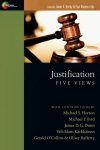
Justification: Five Views
- Editors: James K. Beilby and Paul Rhodes Eddy
- Series: IVP Spectrum Series
- Publisher: IVP Academic
- Publication Date: 2011
- Pages: 320
"Therefore, since we have been justified by faith, we have peace with God through our Lord Jesus Christ" (Rom 5:1). When Paul wrote these words, he seemed confident he had made himself clear. But for centuries the Pauline doctrine of justification has been a classic point of interpretation and debate in Christian exegesis and theology. And while in recent decades there have been moments of hopeful convergence among the various traditions of the Western church, the fine print often reveals more facets and distinctions than ever before.
This volume focuses on five views of justification and calls on representative proponents to set forth their case and then respond to each other. The five views are:
- Traditional Reformed (Michael S. Horton)
- Progressive Reformed (Michael F. Bird)
- New Perspective (James D. G. Dunn)
- Deification, or Theosis (Veli-Matti Kärkkäinen)
- Roman Catholic (Gerald O’Collins and Oliver Rafferty)
In addition, the editors provide an extensive introduction to the issues informing this important debate. This distinguished forum of biblical interpreters and theologians offers a lively and informative engagement with the biblical, historical, and contemporary understandings of justification. Justification: Five Views is not only a fascinating probe into Paul’s meaning, it is also a case book in theological method.
[T]his volume is well worth reading, and it is appropriate for students and scholars. The editors have done a fabulous job in organizing the material and assembling an all-star lineup. Readers will not be disappointed with this excellent resource.
—Kevin P. Emmert, Trinity Journal, Spring 2014
Of all the multiple views books, this one was needed most. It is also perhaps the best yet: getting Horton, Dunn, Bird, Kärkkäinen, O'Collins, and Rafferty all at the table at the same time under the same roof is both a tour de force and a brilliant example of how their interaction can teach each of us. One word is needed most for the justification debate at work among (mostly) evangelicals, the word listen, and if you listen to the pages of this book, you will see examples of not listening and listening. The challenge remains for all of us: will we listen again to the Scriptures to hear what it says about justification? Or will we impose our systems of thought on the Bible?
—Scot McKnight, North Park University
Beilby and Eddy have raised the bar with regard to this multiple views genre, this time bringing together world-renowned scholars and theologians to engage a very hot topic. Reading Justification: Five Views is like being treated to five books by five masters of their craft, each going deep into the details at times but yet also stepping back to cover the forest ably enough for the less initiated to appreciate what is at stake. A must-read for those interested in the ecumenical implications of the doctrine of justification.
—Amos Yong, Regent University School of Divinity
James K. Beilby is professor of systematic and philosophical theology at Bethel University in St. Paul, Minnesota. His books include Why Bother With Truth?, The Meaning of the Atonement: Four Views, Naturalism Defeated?, and For Faith and Clarity. His articles and essays have appeared in such publications as Faith and Philosophy, Philosophia Christi, Religious Studies, International Journal for Philosophy of Religion, and Journal of the Evangelical Theological Society.
Paul R. Eddy is professor of theology at Bethel University in St. Paul, Minnesota. His books include John Hick's Pluralist Philosophy of World Religions, Across the Spectrum: Understanding Issues in Evangelical Theology, and Divine Foreknowledge: Four Views.
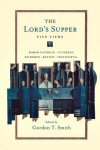
Lord's Supper. Eucharist. Communion. Sacrament. Ordinance.
While it's the meal that should unite us as followers of Christ, it sometimes appears we can't even agree on what to call it, let alone how we might share a common theological view of its significance. Even if we cannot reach full agreement, how can we better understand one another and this central observance of the Christian faith?
Gordon Smith has invited five representatives of differing views within Christian tradition. Each holds his or her views with conviction and makes the case for that tradition. Each responds to the other views with charity, highlighting significant areas of agreement and disagreement.
What this volume does well is to show how within each tradition there is real overlap and points for conversation. This is a great introductory volume.
—Kyle Strobel, Theology Forum (theologyforum.wordpress.com), December 17, 2008
The Lord's Supper: Five Views contains a wealth of important information, especially in regards to the history of each position.
—Trevin Wax, Kingdom People (trevinwax.com), November 13, 2008
I wish I had had this book years ago when I moderated a wide-spread e-mail discussion group that focused on the meaning of Holy Communion. . . . In the end, it makes for an insightful look into a major sacrament that has divided Christianity for centuries. This would be a great study book for church groups.
—Bill Tammeus, Faith Matter (billtammeus.typepad.com), August 23, 2008
Gordon T. Smith (PhD, Loyola School of Theology, Ateneo de Manila University) is the president of Ambrose University and Seminary in Calgary, Alberta, where he also serves as professor of systematic and spiritual theology. He is an ordained minister with the Christian and Missionary Alliance and a teaching fellow at Regent College, Vancouver, BC. He is the author of many books, including Courage and Calling, Called to Be Saints, and The Voice of Jesus.
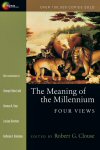
Since the first century, Christians have agreed that Christ will return. But since that time, there have also been many disagreements. How will Christ return? When will he return? What sort of kingdom will he establish? What is the meaning of the millennium? These questions persist today.
Four major views on the millennium have had both a long history and a host of Christian adherents. In this book, Robert G. Clouse brings together proponents of each view: George Eldon Ladd on historic premillenniallism, Herman A. Hoyt on dispensational premillennialism, Loraine Boettner on post-millennialism, and Anthony A. Hoekema on amillennialism.
After each view is presented, proponents of the three competing views respond from their own perspectives. Here you'll encounter a lively and productive debate among respected Christian scholars that will help you gain clearer and deeper understanding of the different ways the church approaches the meaning of the millennium.
This work is an excellent introduction to the discussion as well as a pointer to additional works on the subject.
—TSF Bulletin
A stimulated debate and an excellent learning tool . . . . The book opens a fresh and fruitful dialogue.
—Southwestern Journal of Theology
Congratulations to IV Press and to editor Clouse for bringing together the most adequate dialogue yet on the divergent eschatological understandings found in modern evangelicalism.
—Prebyterian Covenant Seminary Review
Robert G. Clouse (PhD, University of Iowa) was professor emeritus of history at Indiana State University in Terre Haute, Indiana. He is also an ordained Brethren minister and has served churches in Iowa and Indiana.
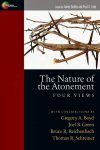
A long history of biblical exegesis and theological reflection has shaped our understanding of the atonement today. The more prominent highlights of this history have acquired familiar names for the household of faith: Christus Victor, penal substitutionary, subjective, and governmental. Recently the penal substitutionary view, and particularly its misappropriations, has been critiqued, and a lively debate has taken hold within evangelicalism. This book offers a "panel" discussion of four views of atonement maintained by four evangelical scholars.
Following an introduction written by the editors, each participant first puts forth the case for their view. Each view is followed by responses from the other three participants, noting points of agreement as well as disagreement. This is a book that will help Christians understand the issues, grasp the differences, and proceed toward a clearer articulation of their understanding of the atonement.
The directness of the responses is a strength of the book. It serves to highlight differences, expose weak points, and provide the reader with questions and issues to pursue. The book makes a positive contribution both through highlighting the diversity of thinking about the atonement within evangelicalism and through encouraging discussion about this diversity.
—Mark D. Baker, Religious Studies Review, March 2010
One strength of this study is its multifaceted scope. The book presents four views side by side and allows the reader quickly to see what the primary differences and similarities are between the various positions. By including defenses of positions by those who hold to these divergent views, this volume adds a valuable dimension to the evangelical discussion on the issue of the atonement.
—Ched Spellman, Says Simpleton, April 11, 2008
There are a number of reasons to applaud The Nature of the Atonement, not least its provocative and illuminating presentation. . . . If you are looking for a more focused discussion on the atonement—that is, in terms of today's evangelical milieu, The Nature of the Atonement can certainly serve as a fine forum for exploring essential matters of the Christian faith.
—Kathleen Borres, Catholic Books Review, http://catholicbooksreview.org/2006/beilby.htm
James K. Beilby is professor of systematic and philosophical theology at Bethel University in St. Paul, Minnesota. His books include Why Bother With Truth?, The Meaning of the Atonement: Four Views, Naturalism Defeated?, and For Faith and Clarity. His articles and essays have appeared in such publications as Faith and Philosophy, Philosophia Christi, Religious Studies, International Journal for Philosophy of Religion, and Journal of the Evangelical Theological Society.
Paul R. Eddy is professor of theology at Bethel University in St. Paul, Minnesota. His books include John Hick's Pluralist Philosophy of World Religions, Across the Spectrum: Understanding Issues in Evangelical Theology, and Divine Foreknowledge: Four Views.
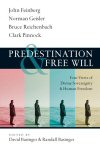
If God is in control, are people really free? This question has bothered Christians for centuries. And answers have covered a wide spectrum. Today Christians still disagree. Those who emphasize human freedom view it as a reflection of God's self-limited power. Others look at human freedom in the order of God's overall control.
David and Randall Basinger have put this age-old question to four scholars trained in theology and philosophy. John Feinberg of Trinity Evangelical Divinity School and Norman Geisler of Dallas Theological Seminary focus on God's specific sovereignty. Bruce Reichenbach of Augsburg College and Clark Pinnock of McMaster Divinity College insist that God must limit his control to ensure our freedom. Each writer argues for his perspective and applies his theory to two practical case studies. Then the other writers respond to each of the major essays, exposing what they see as fallacies and hidden assumptions.
David Basinger is professor of philosophy and ethics at Roberts Wesleyan College in Rochester, New York. He is the author of Divine Power in Process Theism (SUNY) and joint author of the books Reason and Religious Belief: An Introduction to the Philosophy of Religion (Oxford) and Religious Diversity: A Philosophical Assessment (Ashgate).
Randall Basinger is currently dean of curriculum at Messiah College in Grantham, Pennsylvania. Among his published work is the essay “Faith/Reason Typologies: A Constructive Proposal,” in Christian Scholar's Review (1997).
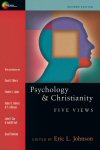
How are Christians to understand and undertake the discipline of psychology? This question has been of keen interest (and sometimes concern) to Christians because of the importance we place on a correct understanding of human nature. Psychology can sometimes seem disconnected from, if not antithetical to, Christian perspectives on life. How are we to understand our Christian beliefs about persons in relation to secular psychological beliefs?
This revised edition of a widely appreciated text now presents five models for understanding the relationship between psychology and Christianity. All the essays and responses have been reworked and updated with some new contributors, including the addition of a new perspective, the transformative view from John Coe and Todd Hall (Biola University).
Also found here is David Powlison (Westminster Theological Seminary), who offers the biblical counseling model. The levels-of-explanation model is advanced by David G. Myers (Hope College), while Stanton L. Jones (Wheaton College) offers an entirely new chapter presenting the integration model. The Christian psychology model is put forth by Robert C. Roberts (Baylor University), now joined by Paul J. Watson (University of Tennesee, Chattanooga).
Each of the contributors responds to the other essayists, noting points of agreement as well as problems they see. Eric L. Johnson provides a revised introduction that describes the history of Christians and psychology, as well as a conclusion that considers what might unite the five views and how a reader might evaluate the relative strengths and weaknesses of each view.
Eric L. Johnson (PhD, Michigan State University) is trained as an academic psychologist and is Lawrence and Charlotte Hoover Professor of Pastoral Care at The Southern Baptist Theological Seminary in Louisville, Kentucky. He is coeditor of God Under Fire and the author of Foundations for Soul Care. He is an associate editor of the Journal of Psychology and Theology, Journal of Psychology and Christianity, and the Journal of Spiritual Formation and Soul Care. He is also the director of the Society for Christian Psychology.
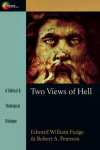
Some evangelicals believe the wicked will experience perpetual, conscious torment after death. Others argue that the wicked will experience a limited period of conscious punishment and then they will cease to exist. In this book, you will find an irenic yet frank debate between two evangelical theologians who present strong scriptural and theological evidence for and against each view. Both make a case that their view is more consistent with Scripture and with the holy and just nature of a loving God.
Robert Peterson defends the traditional view that those who do not have faith in Christ will suffer eternally in hell. Edward Fudge advocates the conditionalist perspective that after a period of suffering, the unfaithful will experience a complete extinguishing, or annihilation, of existence. In addition, each author presents a rebuttal to the viewpoint of the other.
Here is a dialogue that will inform and challenge those on both sides, while impressing on all the need for faithful proclamation of the gospel of deliverance from sin and death.
The book is much needed. The debate over the nature of hell shows no sign of going away, and this book gives a good and thorough presentation of both sides in just over two hundred pages. I hope it receives a wide and careful reading.
—Faith & Mission
Fudge and Peterson . . . have produced a clear and readable account of the biblical grounds for their positions. Fudge's interpretations of the scriptural data is plausible, as is Peterson's, and neither can dismiss the other by claiming that Scripture clearly supports their view. This book serves well the purpose of laying out the exegetical grounds for both sides.
—Philosophia Christi
A very worthwhile book, especially since it gives both sides of the argument. This gives the book a fairness that should be appreciated.
—Reformed Review
Edward William Fudge is a theologian and practicing lawyer based in Texas. He is the author of The Fire That Consumes: A Biblical and Historical Study of the Doctrine of Final Punishment.
Robert A. Peterson (PhD, Drew University) is professor of systematic theology at Covenant Theological Seminary in St. Louis, Missouri. He was formerly professor of New Testament and theology at Biblical Theological Seminary in Hatfield, Pennsylvania.
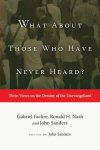
What is the fate of those who die never hearing the gospel? Do Hindus, Jews, agnostics, and others who do not profess faith in Christ really suffer damnation after death? These and similar questions have long been contemplated by people from every religious persuasion and every walk of life. But in a culture of increasing diversity and growing doubt in the existence of "objective truth," it seems ever more pressing.
In this book, three scholars present the span of evangelical conviction on the destiny of the unevangelized. Ronald Nash argues the restrictivist position, that receptive knowledge of Jesus Christ in this life is necessary to salvation. Gabriel Fackre advocates divine perseverance, with the expectation that those who die unevangelized receive an opportunity for salvation after death. And John Sanders sets forth the inclusivist case—asserting that, though God saves people only through the work of Jesus Christ, some may be saved even if they do not know about Christ.
As each scholar presents his own case and responds to strengths and weaknesses of differing positions, readers are treated to a lively and informative debate. What About Those Who Have Never Heard? is a truly helpful book on one of today's—and every day's—most crucial questions.
Gabriel Fackre is Samuel Abbot Professor of Christian Theology Emeritus at Andover Newton Theological School in Newton Centre, Massachusetts. He is the author of The Christian Story.
Ronald H. Nash (1936-2006) served as a professor of religion and philosophy for many years, teaching at Western Kentucky University, Reformed Theological Seminary, and The Southern Baptist Theological Seminary. His many books include The Gospel and the Greeks, Life's Ultimate Questions, and Is Jesus the Only Savior?
John Sanders (ThD, University of South Africa) is professor of religion at Hendrix College in Conway, Arkansas. He has edited and written several books, including No Other Name: An Investigation into the Destiny of the Unevangelized. Three of his previous book projects have received a Christianity Today Book Award.
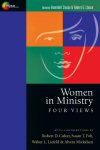
Should women teach men? Should they exercise authority over men? What about ordaining women? Even those who agree that Scripture must determine our answers do not agree on what it teaches. And too often differing sides have not been willing to listen to one another. Here in one volume are the views of four deeply commited evangelicals that focus the discussion on the issues.
Robert Culver argues for what might be called the traditional view that women should not exercise authority over or teach men. Susan Foh suggests a modified view, which would allow for women to teach but not to hold positions of authority. Walter Liefeld presents a case for plural ministry that questions ordination as a means of conferring authority. Alvera Mickelsen defends the full equality of men and women in the church. What makes this book especially helpful is that the writers all respond to the other essays, pointing out weaknesses and hidden assumptions.
Robert G. Clouse (PhD, University of Iowa) is professor emeritus of history at Indiana State University in Terre Haute, Indiana. He is also an ordained Brethren minister and served churches in Iowa and Indiana.
Bonnidell Clouse is professor of history at Indiana State University and has served as president of the Central Renaissance Conference.
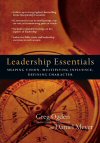
Leadership is essential. Maybe you've shied away from leadership because you don't know what it will involve, or you feel too unsure of your own abilities. But your leadership is needed! In every sector of society, from families to businesses to churches, leadership roles remain empty, waiting for people willing and able to step up and make wise decisions that bring positive change. And, in a world with priorities vastly different from Christ's, Christian leaders are especially needed to point people to him.
Preparation is essential. As essential as the leadership itself is the preparation beforehand, which is why Greg Ogden, a seasoned leader himself, has created this interactive guide that will give you the tools you need to lead well, using your unique gifts and experience.
Divided into four sections, this workbook will help you develop character, postures, vision, and skills. By working through these multiple channels of learning, you'll be equipped not just with head knowledge about leadership but with true character formation and awareness of your own abilities that will prepare you for the challenges and choices of leadership.
[A]n excellent book for a leadership team to work through together. Working through this book will help develop your own abilities and prepare you to mentor others in leadership.
—Mark W. Cannister, YouthWorker Journal, July/August 2008
Greg Ogden (DMin, Fuller Theological Seminary) recently retired from professional church leadership and now lives out his passion of speaking, teaching, and writing about the disciple-making mission of the church. Most recently, Greg served as executive pastor of discipleship at Christ Church of Oak Brook in the Chicago western suburbs. From 1998-2002, Greg held the position of director of the Doctor of Ministry Program at Fuller Theological Seminary and associate professor of lay equipping and discipleship.
Prior to teaching at Fuller, Greg enjoyed 24 years in pastoral ministry, primarily within Presbyterian churches, but also as senior pastor at the Saratoga Federated Church in the Silicon Valley, California. While there, he developed a discipleship program used by over 15,000 people and resulting in his book Discipleship Essentials and eventually the Essentials Series. Greg's other books include Unfinished Business and Transforming Discipleship.
Daniel Meyer is a graduate of Yale University (BA), Princeton Theological Seminary (MDiv) and Fuller Theological Seminary (DMin) and has served since 1997 as senior pastor of Christ Church of Oak Brook in Chicago's western suburbs. His weekly messages are broadcast on television, radio, and the Internet and are frequently featured on PreachingToday.com.
Additionally, Dan serves as on-air host and chairman of LIFE FOCUS, a multiple Emmy Award-winning television newsmagazine aired on PBS and other stations nationwide. He is a member of the Board of Trustees of Fuller Theological Seminary, the Deans Advisory Board of Midwestern University, and the Board of the Executives Breakfast Club of Oak Brook.
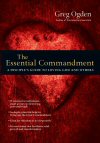
In this practical, in-depth handbook, Ogden draws from his years of pastoral experience training and discipling others to help us truly be changed by Christ into people who love God and love others with all that we are. Following the format of his bestselling Discipleship Essentials, each chapter includes a core truth, a memory verse, an inductive Bible study, and a reading on one aspect of the Great Commandment.
Thoughtful questions will also help you examine your heart and life and move you to open yourself to God's transforming work. Above all, Ogden helps you see that the Great Commandment is actually a great invitation to join God in bringing his kingdom to earth. And as you learn to do so, you'll find that the greatest commandment leads to the greatest life possible.
In The Essential Commandment, Greg Ogden has once again taken the complex subject of Christian discipleship and made it truly understandable and personally applicable. After reading this book, you will wonder why more authors have not made the Great Commandment of Jesus their central focus. More importantly, you will be grateful that Ogden has given you another essential tool for finding your way and helping others into the deeper life of Christ.
—Daniel Meyer, senior pastor of Christ Church of Oak Brook; author, Witness Essentials.
Greg Ogden (DMin, Fuller Theological Seminary) recently retired from professional church leadership and now lives out his passion of speaking, teaching, and writing about the disciple-making mission of the church. Most recently, Greg served as executive pastor of discipleship at Christ Church of Oak Brook in the Chicago western suburbs. From 1998-2002, Greg held the position of director of the Doctor of Ministry Program at Fuller Theological Seminary and associate professor of lay equipping and discipleship.
Prior to teaching at Fuller, Greg enjoyed 24 years in pastoral ministry, primarily within Presbyterian churches, but also as senior pastor at the Saratoga Federated Church in the Silicon Valley, California. While there, he developed a discipleship program used by over 15,000 people and resulting in his book Discipleship Essentials and eventually the Essentials Series. Greg's other books include Unfinished Business and Transforming Discipleship.
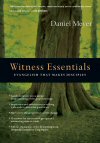
You know the radical difference the gospel of Jesus Christ makes, and you want others to see and enjoy its benefits. In fact, you don't want them to just pray a prayer and move on to the next interesting thing. You want them to sink their roots deeply into the grace of God.
So often, though, you feel that you are inadequate to this important task—that you don't know enough or that you will offend your friends. Daniel Meyer has provided the tools you need to move forward: the basics of the gospel message, the role of life change in your witness, and how to present the good news.
The Bible studies, exercises, and readings in this book will deepen your personal faith and equip you to minister to others with a new sense of confidence and calling.
Too many well-meaning Christians reduce evangelism to the minimum set of requirements needed to get into heaven. In Witness Essentials, Dan Meyer masterfully captures the fullness of the gospel movement Jesus started 2000 years ago and how every believer can move beyond unfortunate evangelism stereotypes to live out that deep desire inside every Christian—to play a role in helping others begin a relationship with Jesus. Witness Essentials is theologically well-grounded, true to real life, and filled with relationally intelligent and practical steps to help people be the witness for Christ they long to be. I wish it was required reading for every Christian serious about inviting others into the great adventure of knowing and walking with God.
—Jim Mellado, president, Willow Creek Association
Daniel Meyer is a graduate of Yale University (BA), Princeton Theological Seminary (MDiv) and Fuller Theological Seminary (DMin) and has served since 1997 as senior pastor of Christ Church of Oak Brook in Chicago's western suburbs. His weekly messages are broadcast on television, radio, and the Internet and are frequently featured on PreachingToday.com.
Additionally, Dan serves as on-air host and chairman of LIFE FOCUS, a multiple Emmy Award-winning television newsmagazine aired on PBS and other stations nationwide. He is a member of the Board of Trustees of Fuller Theological Seminary, the Deans Advisory Board of Midwestern University, and the Board of the Executives Breakfast Club of Oak Brook.
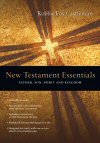
"I was introduced to the gospel of Jesus Christ as a college student. The Jesus of the New Testament overwhelmed me, and by God’s grace Jesus still does," writes professor Robbie Castleman, author of New Testament Essentials. Her love of Jesus and Scripture is evident in this study, which seeks to answer the question Jesus’ disciples posed: "What kind of man is this?" (Matthew 8:27).
New Testament Essentials introduces us to the New Testament in three parts: The revelation of God in Jesus Christ, the indwelling of God in the church by the Holy Spirit, and the present and coming kingdom of God. In each of the twelve studies, the author helps us to hear Scripture in its own historical and cultural context before guiding us to apply it to our own context.
Jesus’ life, teachings, and works were thoroughly grounded in the Hebrew Scriptures. And so each session includes a special feature called "Connecting to the Old Testament." Through this you will begin to discover the links between the two testaments and gain a fuller sense of our unfolding salvation history.
Castleman's choice of key passages is enhanced by her own crisp commentary, by linking these passages to illuminating Old Testament parallels and by offering readers opportunities to share their own reflections on the drama of salvation for their lives today. I can't think of a more positive introduction to the Bible for those who wish to grow in their knowledge of Scripture and faith.
—James R. Edwards, Professor of Theology, Whitworth University
Robbie Castleman has done it again. New Testament Essentials is a delicious blend of research, accessibility, and devotion that challenges the reader to examine core beliefs and convictions in light of the only book from which we might abstract the ministry and nature of Jesus of Nazareth. Used in the context of private study or, even better, group interaction, this book is an excellent resource for those who are looking to more deeply root and enliven their faith.
—Chris Yaw, founder, churchnext.tv
Jesus is at the heart of our faith, and we meet him most clearly in the pages of the New Testament, which also describes the work of the Spirit and the kingdom of God. Robbie Castleman masterfully leads us in a study that introduces us to the glorious teaching of the New Testament, a study that deepens our love and trust in our Savior.
—Tremper Longman III, Westmont College, author, Old Testament Essentials
Robbie Fox Castleman DMin, University of Dubuque) is professor of biblical studies and theology at John Brown University in Siloam Springs, Arkansas. She previously served for several years as a staff member with InterVarsity Christian Fellowship, specializing in ministry to graduate students at campuses in and around Tallahassee, Florida.
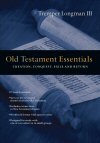
"Christians love the Bible, but they often do not know what to do with the Old Testament," writes Westmont College professor Tremper Longman. Further, he points out that it includes many types of writing—history, prophecy, poetry, wisdom, and apocalyptic. In this helpful volume, he offers different strategies for understanding each of these important types of writing.
Jesus made a point to tell his disciples that the whole Old Testament anticipated his coming (see especially Luke 24:25-27, 44-45). And so each session includes a special feature called "Anticipating the New Testament." Through this you will begin to discover the links between the two testaments and gain a fuller sense of our unfolding salvation history.
I recommend [Old Testament Essentials] to pastors, Christian education directors, and small-group leaders and participants.
—Daniel Johnson, CBA Retailers + Resources, January 2014
Tremper Longman is for me—and countless others—a treasured 'go-to' resource to uncover the treasures of Old Testament wisdom. This survey will be of huge value to anyone who wants the big picture of the Great Story.
—John Ortberg, senior pastor, Menlo Park Presbyterian Church; author, Who Is This Man?
With a good mix of study materials and questions, this curriculum is well-suited for adult classes, a Bible study, or one-on-one discipleship.
—Elliot Ritzema, Bible Study Magazine, July-August 2014
Tremper Longman III (MDiv, Westminster Theological Seminary; PhD, Yale University) is Robert H. Gundry Professor of Biblical Studies at Westmont College. He is also visiting professor of Old Testament at Mars Hill Graduate School, visiting professor of Old Testament at Westminster Theological Seminary, and adjunct of Old Testament at Fuller Theological Seminary. He lectures regularly at Mars Hill, Regent College in Vancouver, and the Canadian Theological Seminary in Calgary. Longman is the author or coauthor of over 20 books, including An Introduction to the Old Testament (with Raymond B. Dillard) and many others.
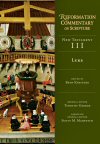
"For unto you is born this day in the city of David a Savior, who is Christ the Lord." Reflecting on this verse from the Gospel of Luke (2:11), Martin Luther declared it to be a summary of the gospel: "See here what the gospel is, namely, a joyful sermon about Christ our Savior. Whoever preaches him rightly preaches the gospel and pure joy."
Reformation commentators meditated upon the significance of the good news of Jesus Christ during a vibrant era in the history of the church that was characterized by spiritual renewal and reform, doctrinal controversy (especially over matters such as the presence of Christ in the Lord’s Supper) and the overriding desire to understand the meaning and implications of Scripture for Christian belief and practice. While in many ways similar to the other Synoptic Gospels, the Gospel of Luke also testified to this good news through unique material, including the announcement of Jesus’ birth to the shepherds in the fields, the parable of the prodigal son, and Jesus’ appearance to his disciples on the road to Emmaus after his resurrection.
In this volume, Beth Kreitzer skillfully leads readers through the rich diversity of the Gospel of Luke. Readers will be able to listen to both well-known and lesser-known voices from a variety of theological traditions, including Lutherans, Reformed, Radicals, Anglicans, and Roman Catholics, many of whose comments appear for the first time in English. By drawing from an array of Reformation resources - including commentaries, sermons, treatises, and confessions - this volume will equip scholars to understand better the depth and breadth of Reformation commentary, and it will provide contemporary preachers with resources from those in the Reformation church who sought to understand the meaning of this "good news of great joy" (2:10).
Beth Kreitzer (PhD, Duke University) is coordinator of liberal studies at Belmont Abbey College. She is the author of Reforming Mary: Changing Images of the Virgin Mary in Lutheran Sermons of the Sixteenth Century and several professional articles on religious subjects.
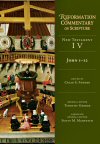
The first 18 verses of the Gospel of John make some of the most profound statements about the character and work of Christ in all of Scripture: "In the beginning was the Word, and the Word was with God, and the Word was God" (1:1); "all things were made through him" (1:3); "the Word became flesh and dwelt among us" (1:14).
Reformation commentators ruminated on the meaning and implications of such claims for shedding light on doctrines like the Trinity, the divinity of Christ, and his incarnation, but also for grasping the saving benefits of Christ's work in justification (for those "who believed in his name") and new birth (those born of God as his children, 1:12-13).
In this volume, Craig Farmer expertly guides readers through Reformation meditation on these themes and many others as they are unpacked in the first 12 chapters of the Gospel of John, from the Prologue to Jesus' triumphal entry into Jerusalem. Here you will find a rich mosaic of reflection on the Gospel of John by a variety of significant well-known and lesser-known figures among the Reformed, Lutherans, Radicals, and Roman Catholics. Farmer has done justice to the depth and nuance of the work of these Reformation-era pastors and scholars by drawing from a range of genres—extensive commentary, brief annotations, impassioned sermons, official confessions, and careful doctrinal and practical treatises.
Contemporary scholars will find this volume indispensable for understanding the significance of the "spiritual Gospel" for Reformation theology and practice, and pastors will discover here a consistently fruitful source for preaching, teaching, and discipleship in the "grace and truth" that have come through Jesus Christ (1:17).
Craig S. Farmer (PhD, Duke University) is professor of history and humanities and Joel O. and Mabel Stephens Chair of the Bible at Milligan College, Tennessee. He is the author of The Gospel of John in the Sixteenth Century: The Johannine Exegesis of Wolfgang Musculus.
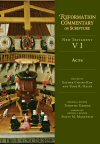
The Reformation was a call to return with renewed vigor to the biblical roots of Christian faith and practice. Still, for the Reformers, the truth of the Bible could never be separated from the true community of God's people gathered by his Word. In the book of Acts, they found God's blueprint for how the church should participate with the Holy Spirit in accomplishing his purposes in the world.
In the latest Reformation Commentary on Scripture, the diverse streams of the Protestant movement converge on the book of Acts, providing a lesson in the nature of biblical reform from those who bore it out for the first time. Authors Esther Chung-Kim and Todd R. Hains present a vivid portrait of the Reformers’ views on the contemporary church’s faithfulness to its God-given identity and calling.
The Reformers approached the narrative account of the early church in the book of Acts from diverse viewpoints. Commentators like John Calvin and the Swiss Reformer Heinrich Bullinger elaborated on the theological implications of the text with a great deal of historical detail. Others like reform-minded Catholic Johann Eck evoked episodes in Acts in response to pressing concerns of the day. Sermons upheld notable characters in Acts such as Peter, Stephen, Paul, Lydia, and Apollos as examples of robust faith and of life in Christian community. Anabaptists in their apologetic works focused heavily on the necessity of believer's baptism.
The commentators' interactions range from irate disagreement to irenic concord, but all exhort their readers not to dissolve "the holy knot" of the plain history of Christ's works and their lasting fruits. For them, Acts is certainly history, but it cannot be mere history.
Esther Chung-Kim (PhD, Duke U.) is assistant professor of religious studies at Claremont McKenna College, Claremont, California. She is the author of Inventing Authority.
Todd R. Hains is a PhD candidate in historical theology at Trinity Evangelical Divinity School in Deerfield, Illinois, and assistant project editor of the Reformation Commentary on Scripture.
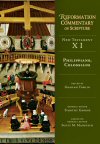
Paul’s letters to the Philippians and Colossians celebrate the glory and supremacy of Jesus Christ and his saving work, a refrain that the reformers never grew tired of singing. While their tones are diverse, the clarity of their compositions and the power of their voices still reverberate today.
Reformation commentators found the main themes of these Pauline letters deeply applicable to their circumstances, and volume editor Graham Tomlin urges that they are just as relevant to our own: Philippians overflows with thanksgiving in the midst of persecution and trials; Colossians defends the superiority of Jesus as Lord over all principalities and powers. For the Reformers as well as for Paul, all goodness and grace flows from Christ in whom "all the fullness of God was pleased to dwell" (Col 1:19), the Son who "made himself nothing" (Phil 2:7) in order to bring many daughters and sons to glory.
This volume assembles a diverse chorus spanning place, time, and confessional differences: from Italian Reform-minded Catholic Gasparo Contarini and German Lutheran Martin Chemnitz, to Dutch Anabaptist Menno Simons, to French Reformed Theodore Beza and English Puritan Richard Sibbes. Scholars and pastors alike will find many fruitful insights from these and a number of other significant figures— most of whom enjoy fresh translations from the original, many for the first time in English.
Graham Tomlin (PhD, Exeter University) is principal of St. Mellitus College, London. He taught on Martin Luther and the Reformation in the theology faculty of the University of Oxford for eight years. He is the author, among many other publications, of The Power of the Cross: Theology and the Death of Christ in Paul, Luther and Pascal, The Provocative Church, Luther and His World, and the Archbishop of Canterbury’s Lent Book for 2014: Looking Through the Cross.
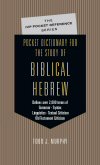
Of Greek and Hebrew, Hebrew strikes the most fear in the heart of the Bible student. The alphabet does not look anything like English. The vocabulary offers almost no points of contact with English. The verb system is utterly alien. And the lexicons, grammars, and textbooks are wrapped up in a metalanguage—spiked with Latin—that is daunting in itself. For those who feel that studying the English Old Testament is a challenge, the thought of reading it in Hebrew is extreme. Hebrew students need all the help they can get.
If you are beginning your study of Hebrew and the Hebrew Bible, this pocket dictionary by Todd J. Murphy is for you. From ablative to zaqeph qaton, it defines the tangled terms that infest Hebrew textbooks, grammars, and lexicons. Here is a book that will deliver you from the perils of the Piel and the thicket of metathesis. It is an indispensable glossary that will cut through that technical language that hovers like ground fog over the study and discussion of biblical Hebrew. Now you can devote more time to enjoying biblical Hebrew in all its richness.
Students from beginners to established scholars find themselves regularly in interaction with technical literature peppered with the arcane vocabulary common to every field of study. This is true of Old Testament Hebrew studies as well. The task of locating the definitions of such unfamiliar terms is time consuming and frustrating. Murphy's Pocket Dictionary meets this need in a clear and comprehensive way. Virtually every terminus technicus having to do with the study of biblical Hebrew is here. The order and logic of the lists and the clarity of the discussion make this tool a delight to use, one that will be indispensable to serious students of the Old Testament Scriptures.
—Eugene H. Merrill, Dallas Theological Seminary
Todd J. Murphy received his MA in Old Testament and Semitic Languages from Trinity Evangelical Divinity School in Deerfield, Illinois. He has also studied biblical history and archaeology in Israel, and he is currently pursuing further graduate study.
Studying church history is like learning your genealogy, with ample helpings of family recipes, scandalous disputes, inspiring heroes, quirky uncles, and scrapbooks of photos thrown in. Someone needs to point out what's important and remind you of the facts as you learn to tell the story on your own.
The Pocket Dictionary of Church History is designed to help students identify the people, places, events, movements, and ideas that checker the story of the church through the ages.Here is an indispensable glossary, the perfect companion to your study and reading of church history.
A Bible study resource that I can recommend for many reasons. The dictionary is small and easy to fit on a book shelf. It is of course economical. Church history is an interesting and important subject for any Christian who wants to understand the church: where it has been and where it is going. Thanks Dr. Feldmeth, for giving the people in the pews an easy-to-use resource for getting a handle on that!
—Joan Tyvoll, 1340mag Books (1340magbooks.com), April 2009
Nathan P. Feldmeth is associate dean for extended education and assistant professor of church history at Fuller Theological Seminary in Pasadena, California. He has contributed articles to InterVarsity Press's New Dictionary of Theology, Dictionary of Christianity in America, and Dictionary of Major Biblical Interpreters.
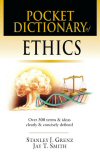
Ethics is as old as the city-state and as new as cyberspace. Guided by the wagon tracks of moral tradition, it nevertheless rides the cutting edge of science and technology. Increasingly, it is moving into the corner offices of law, business, medicine, science, and technology.
But few of us arrive in our first ethics class—or take our seat on an ethics committee—with a grip on the range of ideas and thinkers, perspectives, and pitfalls that make up this ancient conversation about what is good and right and moral. We may feel like college math students who slipped through high school without learning algebra. Not only does this brief and convenient reference book take you where your desktop dictionary was not designed to go, it doubles as your basic A-to-Z survey or refresher course in ethics.
Stanley J. Grenz (1950–2005) was Pioneer McDonald Professor of Theology at Carey Theological College, Vancouver, British Columbia, and professor of theological studies at Mars Hill Graduate School, Seattle, Washington. He authored over 25 books, includingRediscovering the Triune God and What Christians Really Believe and Why.
Jay T. Smith (PhD, Trinity College-University of Bristol, DMin, Carey Theological College) is senior pastor of First Baptist Church in Bozeman, Montana and principal of the Montana Centre for Faith, Adventure, and the Arts.
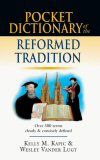
Beginning to study Reformed theology is like stepping into a family conversation that has been going on for 500 years. How do you find your bearings and figure out how to take part in this conversation without embarrassing yourself?
The Pocket Dictionary of the Reformed Tradition takes on this rich, boisterous, and varied tradition in its broad contours, filling you in on its common affirmations as well as its family tensions. Here you will find succinct and reliable entries on latin terms, confessions, and doctrines, as well as theologians such as John Calvin and apologists such as Francis Schaeffer.
The 'pocket' dictionaries are quite handy. Pick them up and keep them near your desk. I use them regularly in preparing myself to talk with others about religious matters and they don't take up much shelf space.
—Chris Reeves, Truth Magazine, May 2014
Kelly M. Kapic is professor of theological studies at Covenant College in Lookout Mountain, Georgia. He earned a PhD in systematic and historical theology at King's College, University of London and an MDiv at Reformed Theological Seminary in Orlando, Florida.
Kapic is the author or editor of numerous books, such as A Little Book for New Theologians, God So Loved He Gave, Communion with God, and Mapping Modern Theology. Additionally, he has published articles in various journals, such as the International Journal of Systematic Theology, Westminster Theological Journal, Conversations in Religion and Theology, and Evangelical Quarterly.
Wesley Vander Lugt (PhD, St. Andrews University) is lead pastor of Warehouse 242 in Charlotte, North Carolina. He earned an MDiv from Covenant Theological Seminary, a BA in history from Covenant College, and has been actively involved in Christian ministry for eight years in Scotland, Mexico, and the United States.
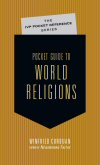
Here is a concise, informative guide for anyone looking for answers to basic questions about the world's varied religions. In short, incisive chapters, Winfried Corduan introduces readers to 12 of the world's major religions, including Baha'i, Buddhism, Christianity, Confucianism, Daoism, Hinduism, Islam, Jainism, Judaism, Parsi, Shinto, and Sikhism. For each, he offers brief descriptions of its name, numbers, and distribution, key symbols, history, Scriptures, major beliefs, subgroups, worship practices, home practices, clothing, diet, and calendar. Also included are even briefer descriptions of 16 new religious movements and traditional or tribal religions. This book is for students, pastors, and other busy people who want the quick, bare-facts scoop on current religions.
This is a book all Christians can readily use. . . . Short and compact, this guide provides an excellent starting point for those wanting to know more about the new world of religions around them. It would be an excellent tool for churches wishing to educate and train their congregations to engage them in their own neighborhoods with some understanding.
—David Ripley, Billy Graham Center, Wheaton, IL, EMQ April 2007
Winfried Corduan (PhD, Rice University) is professor emeritus of philosophy and religion at Taylor University, Upland, Indiana. He has led many undergraduate tours focusing on the lived religious traditions of various parts of the world. He is the author of several books, including Handmaid to Theology, Reasonable Faith: Basic Christian Apologetics, Neighboring Faiths, and A Tapestry of Faiths.
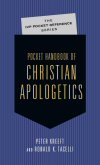
"Be ready to give a reason for the hope that is in you," wrote the apostle Peter. That is what apologetics is all about. Here is a concise, informative guide for anyone looking for answers to questions of faith and reason. Peter Kreeft and Ronald K. Tacelli have condensed their popular Handbook of Christian Apologetics, summarizing the foremost arguments for major Christian teachings and offering compelling responses to the most common arguments put forward against Christianity. In this book, you'll find answers to questions about faith and reason, the existence of God, creation and evolution, the reliability of the Bible, and life after death, among others. The Pocket Handbook of Christian Apologetics is the place to begin for people with questions about Christianity.
Peter Kreeft (PhD, Fordham University) is professor of philosophy at Boston College where he has taught since 1965. A popular lecturer, he has also taught at many other colleges, seminaries, and educational institutions in the eastern United States. Kreeft has written more than fifty books, including The Best Things in Life, The Journey, How to Win the Culture War, and, with Ronald Tacelli, Handbook of Christian Apologetics.
Ronald K. Tacelli SJ, is associate professor of philosphy at Boston College and has published articles in the Public Affairs Quarterly and Downside Review.
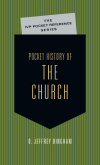
The story of Christianity is a fascinating tale. Here we find drama, vision, and expansion along with failure, setbacks, and tragedy. Yet during the past 2000 years, the power of Jesus is felt throughout the interplay of human actors and the forces of world events.
How can you grasp the story played out on such a gigantic stage? This book is an ideal place to start. D. Jeffrey Bingham has skillfully selected the key people and episodes to tell a grand and humbling story. From Roman persecution to the early creeds, from the monastic movement to the Reformation, from the rise of liberalism to missionary expansion, he chronicles the ups and downs of a people and a faith.
This pocket history has been crafted for students, pastors, and other busy people who want an informed, clear, and concise presentation that feeds the mind and moves the heart. It is an account that nurtures the Christian virtues of faith, hope, and love. For Bingham aims not only to uncover the treasures of the church's past but also to show how history aids your own spiritual journey today.
Jeffrey Bingham has written a carefully etched series of postcards from a big country called The Past. Those who attend to these messages will be illuminated, instructed, and edified. Many will soon realize that there is much, much more to learn about the bearing of Christian history on the present. But all should be thankful for the engaging introduction provided by this book.
—Mark A. Noll, McManis Professor of Christian Thought, Wheaton College
D. Jeffrey Bingham (PhD, Dallas Theological Seminary) is associate dean of biblical and theological studies, and professor of theology at Wheaton College. He is general editor for The Bible in Ancient Christianity Monograph Series from E. J. Brill (Leiden).
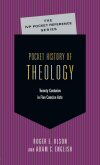
Here is a concise and informative guide to the history of Christian theology. This condensation of Roger Olson's widely acclaimed The Story of Christian Theology surveys the events, teachings, and challenges to the Christian faith down through the ages. In five acts, we are ushered from the second to the twenty-first century, following all the twists and turns, wrinkles, and rivalries that lay along that wonderful and humble way of Christian faith, seeking understanding, articulation, and explanation.
Crafted for students, pastors, and other busy people, this pocket history of theology provides a clear and informed guide to the central tenets of Christian faith and the internal threats and external challenges it has faced and continues to confront even today.
This may be the most important book in the series for Christians to read and study. . . . [The authors] have written in such a practical manner, highlighting the major developments down through church history, that there is no excuse for Christians not taking the time to read and understand what they profess to believe when they confess their faith using creeds and confessions of our history.
—Equip for Ministry, March/April 2006
Roger E. Olson (PhD, Rice University) is professor of theology at George W. Truett Theological Seminary of Baylor University in Waco, Texas. He is the author of The Story of Christian Theology: Twenty Centuries of Tradition & Reform, The Mosaic of Christian Belief: Twenty Centuries of Unity & Diversity, and The Westminster Handbook to Evangelical Theology.
Adam C. English (PhD, Baylor University) is an associate professor in the department of religion and philosophy at Campbell University in Buies Creek, North Carolina. He has published articles and book reviews in Christian Ethics Today, Perspectives in Religious Studies, and the Journal of Church and State. English is an ordained minister in the Baptist tradition and the author of The Possibility of Christian Philosophy (Rutledge, 2007).
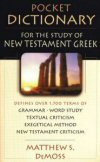
Pocket Dictionary for the Study of New Testament Greek
- Author: Matthew S. DeMoss
- Series: IVP Pocket Reference Series
- Publisher: IVP Academic
- Publication Date: 2001
- Pages: 138
If you are beginning your study of New Testament Greek or Greek exegesis, this book is for you! From ablative to zeugma, it defines the tangled terms that infest Greek textbooks, grammars, and lexicons.
Here is the book to deliver you from late-night ponderings of the predicate and frantic fumings over the fricative. It is the indispensable lexicon to that third language that is neither Greek nor recognizable English: the technical vocabulary of grammarians, lexicographers, linguists, and Greek instructors. This pocket dictionary gives you the inside edge on the terminology of exegesis, textual criticism, and biblical criticism.
For seminary students, pastors, and serious laypeople, this book serves as a wonderful softcover PalmPilot into the lingo of the Greek exegetical world.
—Darrell L. Bock, executive director of cultural engagement and senior research professor of New Testament studies, Dallas Theological Seminary
This bibelot is a veritable gem . . . a very useful key for students of the New Testament and its Greek and a great boon to teachers. I hope that all of my students will wear out at least one copy!
—David M. Scholer, former professor of New Testament, Fuller Theological Seminary
A necessity for students of the Greek New Testament.
—Robert H. Gundry, scholar-in-residence, Westmont College
Matthew S. DeMoss is a book review editor and production manager of Bibliotheca Sacra. He received a BA from Columbia International University and ThM from Dallas Theological Seminary.
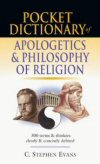
Pocket Dictionary of Apologetics and Philosophy of Religion
- Author: C. Stephen Evans
- Series: IVP Pocket Reference Series
- Publisher: IVP Academic
- Publication Date: 2002
- Pages: 125
For philosophers, the pursuit of truth travels on precise definitions. For Christian apologists, the defense of the faith is founded on the defining Word. And for beginning students of either discipline, the difference between success and frustration begins with understanding the terms and ideas and identifying the thinkers and movements.
The Pocket Dictionary of Apologetics and Philosophy of Religion is designed to be a companion to your study of these two related disciplines. Among its 300 entries are:
- Terms, from a posteriori to worldview
- Apologists, from Abelard to Van Til
- Philosophers of religion, from Alston to Wolterstorff
- Movements, from analytic philosophy to voluntarism
- Apologetic arguments, from the cosmological to the wager
- Theologies, from Arminianism to Zoroastrianism
Here is an affordable and easily accessible help key for your readings, lectures, writing assignments, and exam preparation. It’s a must-have study aid for any student who expects to cogitate on coherentism or ruminate on Ricouer.
C. Stephen Evans is a distinguished university professor of philosophy and the humanities at Baylor University. He previously taught in the philosophy departments at Calvin College, St. Olaf College, and Wheaton College. His publications include Why Believe?, The Historical Christ and the Jesus of Faith: The Incarnational Narrative as History, Kierkegaard’s Ethic of Love, and Keirkegaard on Faith and the Self: Collected Essays.
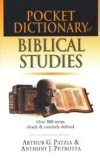
Pocket Dictionary of Biblical Studies
- Authors: Arthur G. Patzia and Anthony J. Petrotta
- Series: IVP Pocket Reference Series
- Publisher: IVP Academic
- Publication Date: 2002
- Pages: 128
If you are puzzled by parataxis or rankled by recensions, the Pocket Dictionary of Biblical Studies is the companion you need. Whether you are studying the Old Testament or New Testament, this little book is your private tutor, your ever-ready guide to over 300 biblical-studies terms. Here’s your glossary for reading course textbooks, your decoder for listening to lectures, your review sheet for cramming for finals, and your help key for writing research papers.
Among the terms defined you’ll discover:
- Types of biblical criticism, from genre criticism to tradition criticism
- Greek and Latin terms, from agrapha to vaticinium ex eventu
- German terms, from Frühkatholizismus to Wissenschaft
- Ancient texts, from Aleppo Codex to Zadokite Document
- Literary features, from acrostic to woe oracle
- Theories, from the Augustinian hypothesis to the Yahwist source
- Textual criticism terms, from codex to Western text
Written by Arthur G. Patzia and Anthony J. Petrotta, two biblical studies professors who know what you need to know, the Pocket Dictionary of Biblical Studies will be your essential guide into a fascinating world of understanding.
Arthur G. Patzia (PhD, McMaster University) is senior professor of New Testament at Fuller Seminary Northern California.
Anthony J. Petrotta (PhD, University of Sheffield) is adjunct associate professor in Old Testament at Fuller Seminary Northern California.
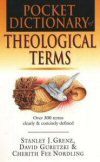
Pocket Dictionary of Theological Terms
- Authors: Stanley J. Grenz, David Guretzki, and Cherith Fee Nordling
- Series: IVP Pocket Reference Series
- Publisher: IVP Academic
- Publication Date: 1999
- Pages: 122
Beginning to study theology is like stepping into a conversation that has been going on for 2,000 years. How do you take part in this conversation—or even make sense of it—if you don’t understand the vocabulary or know the contributions made by other participants?
The Pocket Dictionary of Theological Terms is the perfect companion to your theological studies. Among its 300-plus definitions are:
- English terms, from accomodation to wrath of God
- Foreign terms, from a posteriori to via media
- Theological movements and traditions, from the Alexandrian School to Wesleyanism
- Theologians, from Anselm of Canterbury to Ulrich Zwingli
This may be the most important book in the series for Christians to read and study. . . . [The authors] have written in such a practical manner, highlighting the major developments down through church history, that there is no excuse for Christians not taking the time to read and understand what they profess to believe when they confess their faith using creeds and confessions of our history.
—Equip for Ministry, March/April 2006
Stanley J. Grenz (1950–2005) earned a BA from the University of Colorado at Boulder in 1973, an MDiv from Denver Seminary in 1976, and a DTheol from the University of Munich, Germany in 1978. Ordained into the gospel ministry in 1976, Grenz worked within the local church context as a youth director and assistant pastor at Northwest Baptist Church in Denver, pastor at Rowandale Baptist Church in Winnipeg, and interim pastor.
David Guretzki (PhD, McGill U.) is a professor of theology and serves as the dean at Briercrest Seminary in Caronport in Saskatchewan, Canada.
Cherith Fee Nordling (PhD, University of St. Andrews) works with the Antioch Leadership Network in Grand Rapids, Michigan.
Reviews
3 ratings
Ree S Medeiros
1/19/2023

ekarudi
6/17/2021
Eva Mari Hermosa
3/4/2018
